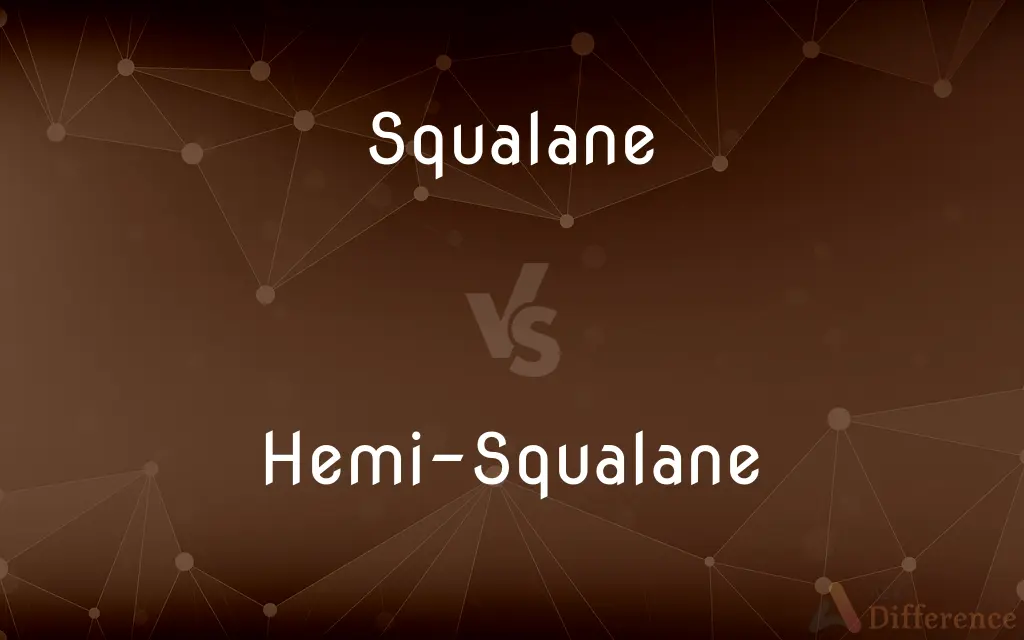Squalane vs. Hemi-Squalane — What's the Difference?
Edited by Tayyaba Rehman — By Maham Liaqat — Published on February 17, 2024
Squalane is a stable, saturated hydrocarbon used in skincare for moisturizing. Hemi-squalane is a lighter version, with lower molecular weight, offering non-greasy hydration.

Difference Between Squalane and Hemi-Squalane
Table of Contents
ADVERTISEMENT
Key Differences
Squalane and hemi-squalane are both hydrocarbons derived from squalene, a natural compound found in shark liver and plant oils. Squalane, a saturated and stable form of squalene, is known for its exceptional moisturizing properties and ability to mimic the skin's natural sebum. It is widely used in skincare and cosmetics for its non-irritating and non-comedogenic qualities, making it suitable for all skin types. Squalane helps to restore the skin's natural barrier, providing hydration and improving skin texture without leaving a greasy residue.
Hemi-squalane, on the other hand, is a lighter derivative of squalane with a lower molecular weight. This makes it more spreadable and less viscous than squalane, providing a lightweight, non-greasy feel on the skin. Hemi-squalane absorbs quickly, making it an excellent choice for hair care products as it can reduce frizz and make hair more manageable without weighing it down. It retains some of the moisturizing properties of squalane but is particularly valued for its light texture and ability to improve skin and hair softness.
The main difference between squalane and hemi-squalane lies in their texture and weight. Squalane is preferred for deep moisturization, suitable for dry to normal skin types looking for intense hydration. Hemi-squalane is best for those who prefer a lighter touch, such as individuals with oily or combination skin, or for use in hair care products where a non-greasy finish is desired.
Both squalane and hemi-squalane are produced through hydrogenation of squalene, but the process for hemi-squalane involves further manipulation to reduce the molecular size. This process enhances its spreadability and absorption rate, making hemi-squalane a versatile ingredient in lightweight moisturizers, serums, and hair treatments.
In summary, while squalane and hemi-squalane share a common origin and moisturizing capabilities, they cater to different needs in skincare and haircare formulations. Squalane offers rich hydration and skin barrier support, while hemi-squalane provides a lighter, fast-absorbing option for moisture without heaviness or residue.
ADVERTISEMENT
Comparison Chart
Molecular Weight
Higher
Lower
Texture
Richer, more moisturizing
Lighter, more spreadable
Absorption
Absorbs deeply but can feel heavier
Absorbs quickly with a non-greasy finish
Best Used For
Dry to normal skin, intense hydration
Oily or combination skin, hair care
Properties
Restores skin barrier, deeply hydrating
Lightweight hydration, reduces frizz in hair
Compare with Definitions
Squalane
Mimics natural sebum, supporting the skin barrier.
Squalane helps my skin stay balanced by mimicking its natural oils.
Hemi-Squalane
Ideal for oily skin and hair care products.
For my oily skin, hemi-squalane provides just enough moisture.
Squalane
Derived from squalene to be fully saturated and stable.
Squalane is a hydrogenated form of squalene, making it shelf-stable.
Hemi-Squalane
Absorbs quickly, offering non-greasy hydration.
Hemi-squalane leaves my skin feeling hydrated without any residue.
Squalane
Used in skincare for its moisturizing properties.
Squalane is my go-to ingredient for combating dry skin.
Hemi-Squalane
Reduces frizz and makes hair manageable.
A few drops of hemi-squalane keep my hair smooth and frizz-free.
Squalane
A stable hydrocarbon used for moisturizing skin.
My nightly skincare routine always includes squalane for deep hydration.
Hemi-Squalane
A lighter version of squalane with lower molecular weight.
I prefer hemi-squalane in the morning for its lightweight feel.
Squalane
Non-comedogenic and suitable for all skin types.
Even with my sensitive skin, I can use squalane without clogging pores.
Hemi-Squalane
Provides a light touch of moisture to skin and hair.
Hemi-squalane is perfect for lightweight hydration needs.
Squalane
(organic compound) A saturated triterpene hydrocarbon made by hydrogenating squalene; used in cosmetics etc.
Common Curiosities
How is hemi-squalane different from squalane?
It's a lighter, lower molecular weight version offering a non-greasy finish.
Can squalane clog pores?
No, it's non-comedogenic and suitable for all skin types.
Is hemi-squalane good for oily skin?
Yes, its lightweight formula is ideal for oily or combination skin.
What is squalane?
A stable, moisturizing compound used in skincare and cosmetics.
How does hemi-squalane benefit hair?
It reduces frizz and makes hair softer and more manageable without greasiness.
Can I use squalane if I have acne-prone skin?
Yes, squalane is suitable for acne-prone skin due to its moisturizing yet non-clogging properties.
How should I incorporate squalane into my skincare routine?
Apply after water-based products as a moisturizer or before sunscreen in the morning.
Does squalane help with skin aging?
Its moisturizing properties can help reduce the appearance of fine lines by keeping skin hydrated.
Where does squalane come from?
It can be derived from shark liver or plant sources like olives and sugarcane.
Is hemi-squalane natural?
Hemi-squalane is produced through the hydrogenation of squalene, which can be sourced naturally.
Does hemi-squalane oxidize or go bad quickly?
No, like squalane, it's stable and resistant to oxidation.
Can I use squalane with other active ingredients?
Yes, squalane pairs well with most active ingredients, including retinol and vitamin C.
Can hemi-squalane replace silicone in hair products?
Yes, it's an excellent silicone alternative for a lightweight, non-greasy feel.
Is there a vegan source of squalane?
Yes, plant-derived squalane from olives or sugarcane is vegan.
How often can I use hemi-squalane?
It's gentle enough for daily use in both skincare and hair care routines.
Share Your Discovery

Previous Comparison
Dyad Muscle vs. Triad Muscle
Next Comparison
Anodic Protection vs. Cathodic ProtectionAuthor Spotlight
Written by
Maham LiaqatEdited by
Tayyaba RehmanTayyaba Rehman is a distinguished writer, currently serving as a primary contributor to askdifference.com. As a researcher in semantics and etymology, Tayyaba's passion for the complexity of languages and their distinctions has found a perfect home on the platform. Tayyaba delves into the intricacies of language, distinguishing between commonly confused words and phrases, thereby providing clarity for readers worldwide.












































